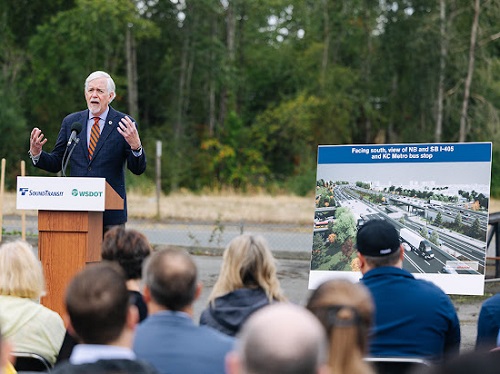In a recent blog post, the Washington State Department of Transportation detailed how it is building sustainability into the I-405/NE 85th St Interchange and Inline Bus Rapid Transit or BRT Station project – an infrastructure endeavor that marks the start of work on the Stride BRT public transit system on I-405.
[Above photo by WSDOT]
Constructed in concert with Sound Transit, the City of Kirkland, design-builder Graham Contracting Ltd., and many regional partners, this new “multimodal hub” includes wider sidewalks on Northeast 85th Street and improved BRT connectivity to the broader regional transit network.
At the same time, the project is building convenient direct access ramps to the I-405 express toll lane or ETL system to help streamline highway commuting for carpooler and ETL users.
Yet WSDOT stressed that the new NE 85th Street Interchange “multimodal hub” does not just make carpooling and using public transportation more convenient; it also incorporates several key environmental stewardship aspects as well:
- Removing fish barriers: WSDOT plans to remove and correct a fish barrier as part of this project; helping sustain and grow salmon and steelhead fish populations while meeting tribal treaty obligations. Fixing fish barriers is essential for preserving ecological balance, sustaining local economies, respecting cultural traditions of local tribes, and creating jobs, while promoting the long-term health and resilience for the state, WSDOT said.
- Replanting native, adaptive plants, and trees: While some tree removal is necessary during construction, WSDOT aims to minimize it as much of that as possible. Many trees removed from the project site will be “repurposed” for stream habitat restoration. Then, at the end of construction, WSDOT plans to replant more trees than were removed; focusing on native species to improve the environment and control non-native plants.
During a construction kick-off event for this multimodal hub, Penny Sweet – mayor of the City of Kirkland – noted that the neighborhood surrounding the project site should be able to “blossom” with opportunities for affordable housing and park amenities, as well as new commercial and retail services.
“Kirkland is all in on BRT and the amazing interchange that will make it all possible,” she said. “We will continue to be an ally and advocate in bringing this generational mobility infrastructure to life.”
